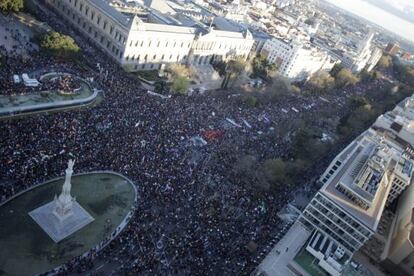Thousands join protestors from all over Spain on “Dignity March”
Demonstrators had traveled from their home regions to call for an end to social spending cuts

Eight “Dignity Marches,” which began all over Spain last week, converged in the capital on Saturday. Around 2,000 people had walked from their home regions to Madrid, where they were joined by tens of thousands more supporters for a mass demonstration. The organizers of the protest estimated that a total of two million people took to the streets to voice their opposition to cuts to social spending, while the government delegation in Madrid put the number at 50,000 at 9pm on Saturday night, later reducing that figure to 36,000.
The marches were designed to express the general malaise that has swept Spain – a malaise chiefly caused by a series of terrifying figures: nearly six million people out of work, tens of thousands of evictions and billions of euros of cuts to social spending.
The march through Madrid was peaceful until night fell, when radical elements began to clash with riot police. By 9pm, there were already 24 arrests, three of whom were minors. What’s more, around 100 people sustained injuries during the clashes, including 55 police officers. In total, 15 people were taken to hospital for checks.
The marches were organized under slogans such as: “Not one more cutback,” and: “Out with the governments of the troika.” But there were plenty more demands to be seen on the banners carried by protestors, such as the one held aloft by Mamen Ruiz: “If you don’t fight, they’ll get you in the end.” The 32-year-old mother of two from Murcia joined her local branch of the Mortgage Victims Platform (PAH) when she saw an eviction first-hand. Meanwhile, Virginia, 47, was demonstrating “against taxes and the abortion reform, and to tell [Justice Minister Alberto Ruiz] Gallardón to resign.”
The march through Madrid was peaceful until night fell, when
radical elements began
to clash with riot police
The march was also joined by sacked workers from Coca-Cola and baker Panrico; Madrid street cleaners, who recently went on strike over pay and conditions; and a number of small leftist parties.
The march started near Atocha train station and made its way up to Colón square. The demonstration went by without incident until around 8.30pm, when a group began throwing objects at riot police stationed near the headquarters of the ruling Popular Party (PP).
It was the only violence seen during the actual march – organizers had expressed their fears beforehand that trouble could break out. “We are afraid that extremist groups may spoil a peaceful march,” explained Agripa Hervás, one of the organizers of the demonstration and a member of the Valencia branch of Esquerra Unida. The police were out in record numbers for the protest, with 1,650 riot officers deployed, as well as members of the Civil Guard and Municipal Police.
Tu suscripción se está usando en otro dispositivo
¿Quieres añadir otro usuario a tu suscripción?
Si continúas leyendo en este dispositivo, no se podrá leer en el otro.
FlechaTu suscripción se está usando en otro dispositivo y solo puedes acceder a EL PAÍS desde un dispositivo a la vez.
Si quieres compartir tu cuenta, cambia tu suscripción a la modalidad Premium, así podrás añadir otro usuario. Cada uno accederá con su propia cuenta de email, lo que os permitirá personalizar vuestra experiencia en EL PAÍS.
¿Tienes una suscripción de empresa? Accede aquí para contratar más cuentas.
En el caso de no saber quién está usando tu cuenta, te recomendamos cambiar tu contraseña aquí.
Si decides continuar compartiendo tu cuenta, este mensaje se mostrará en tu dispositivo y en el de la otra persona que está usando tu cuenta de forma indefinida, afectando a tu experiencia de lectura. Puedes consultar aquí los términos y condiciones de la suscripción digital.








































